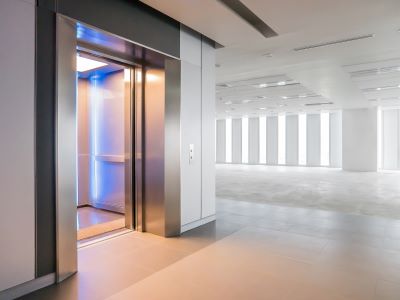
There is a seemingly endless list of mechanical and electronic devices that we use every day, without realizing how dangerous they can be if they malfunction. Add to that list elevators, which, although very safe, do and can cause injury when not in proper working order.
Keeping Clean
Before getting to the mechanical failures that can cause injury, remember that the elevator can have the same problem that areas outside of the elevator have: dirty or wet floors, or floors that simply are not maintained. Arguably, this is even more dangerous in an elevator because we don’t instinctively look at the elevator floor, and in crowded elevators, we may barely be able to see the floor beneath us.
It can also be easy for property owners and businesses to overlook the elevator floor, which can go uncleaned or unchecked for long periods of time.
Uneven Alignments
It is easy to forget how absolutely precise an elevator must be. The elevator cabin where you are standing must come to a stop in a way that it is perfectly aligned with the floor outside of the elevator. If it does not, just a small difference in the elevations can create a “step,” which is really a dangerous ledge.
Crowded, and in a hurry, most people getting off of or onto an elevator won’t ever look down, assuming the surfaces are level, and a serious accident or fall can happen.
Speed Consistency
When elevators travel up and down their corridors, they do so at a consistent speed. But when they malfunction, elevators can jerk violently. Yes, the Hollywood movie scene of the elevator simply dropping, untethered, is almost always just that—a Hollywood movie scene, rarely happening in real life. But an elevator doesn’t have to completely drop; even just an uneven jerking in speed up or down can cause people to fall, or injure backs, ankles or knees.
Doors
Most elevator doors are programmed to re-open if they feel an object like your body impeding the ability to open or close. But some may not be programmed that way, and in fact, may exert serious force on people in the way of the doors. Even if they don’t just keep closing on you, the weight of closing doors on a smaller or older body can cause damage.
Empty Shafts
The idea of falling down an elevator shaft is nightmare fuel for many people—but it can happen, when elevator doors open up but there is no elevator shaft inside—that is, the cabin that you are supposed to be riding in, isn’t there.
You would hope that riders would see that there is no cabin when the doors open, but again, many riders, busy, distracted, and of course, assuming when the doors open that the cabin will be there, may easily step into the area, and fall down the shaft, should the elevator cabin not be present when the doors are opening.
Injured in or around an elevator or on someone’s property? Call the Fort Lauderdale personal injury attorneys at Rosen Injury Law today.
Sources:
us.schindler.com/en/about-us/safety/tips-for-riders-and-owners.html#:~:text=Elevator%20safety%20tips&text=Stand%20clear%20of%20the%20doors,push%20the%20button%20for%20you
neii.org/safety_elevator.cfm